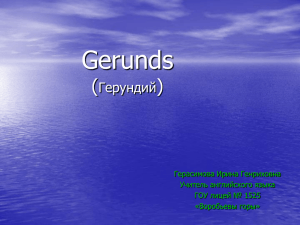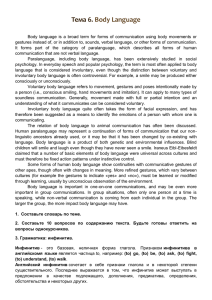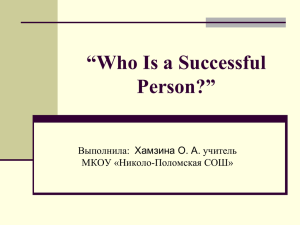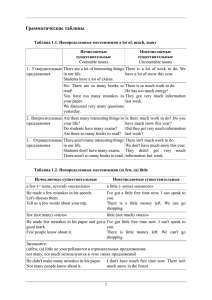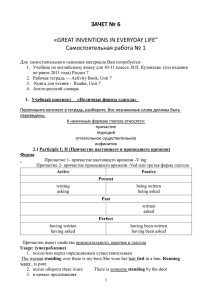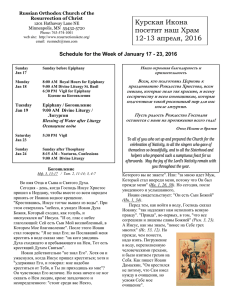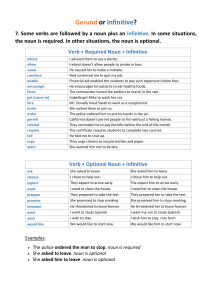INFINITIVE_vs_GERUND
advertisement

INFINITIVE vs GERUND Inna Kriger School 32 Prokopyevsk INFINITIVE с частицей TO [ to + V ] 1. Для выражения цели: She went to the supermarket to buy some cheese. 2. После глаголов, обозначающих отношение к будущему действию другого лица (agree, appear, decide, expect, hope, plan, promise, refuse, want, etc.) в структурах SOMEBODY TO DO SOMETHING: I expect him to be here. I want you to come. She hopes them to arrive without delays. 3. Для выражения определенного предпочтения после WOULD LIKE, WOULD PREFER, WOULD LOVE: I would love to come to your party. INFINITIVE с частицей TO [ to + V ] 4. После прилагательных, обозначающих чувства и эмоции (happy, glad, sad, etc.), готовность / неготовность (eager, reluctant, willing, etc.), проявление черт характера человека (clever, kind, etc.), прилагательных lucky и fortunate по отношению к какому-либо действию: I was sad to hear you were not feeling well. She was eager to help him. He was lucky to win the competition. 5. После TOO, ENOUGH: She’s old enough to watch the film. 6. После BE + the first/second/next/last, etc.: She was the first person to call me on my birthday. INFINITIVE с частицей TO [ to + V ] 7. После глаголов (и выражений с ними) ask, decide, explain, find out, learn, want, want to know, etc., когда за ними следует вопросительное слово (where, when, etc.): She asked me where to get the tickets. 8. В устойчивых выражениях: to tell you the truth, to be honest, to sum up, to begin with: To sum up, the government needs to take measures to deal with unemployment more effectively. 9. После некоторых существительных (honor, goal, way, etc.): It’s an honor to take part in this festival. You can find a better way your time. INFINITIVE с частицей TO [ to + V ] 10. После SO + Adjective + AS: Would you be so kind as to help me with the door? 11. После ONLY, выражающим неудовлетворительный результат: She drove all the way to the mall only to find it was closed. 12. После FOR+NOUN/PRONOUN: It was very unusual for John to speak so rudely. INFINITIVE без частицы TO [V ] 1. После модальных глаголов: Sally can speak Portuguese fluently. 2. После глагольных выражений LET, MAKE, SEE, HEAR, WATCH, NOTICE, FEEL + SOMEBODY (Complex Object): They let him travel on his own. НО! с be made, be heard, be seen (в Passive Voice) инфинитив употребляется с частицей TO! She was seen to speak to flowers in her garden. 3. После HAD BETTER, WOULD RATHER: You had better put a jacket on. НО! После HELP можно употреблять инфинитив с TO и без TO She helped me (to) carry the baggage. GERUND [ Ving ] 1. В роли подлежащего: Exercising is good for your health. 2. После глаголов admit, appreciate, avoid, consider, continue, deny, fancy, go (for adj.), imagine, mind, miss, practise, prevent, quit, save, suggest: You should avoid eating junk food. I appreciate your coming. 3. После глаголов love, like, enjoy, prefer, dislike, hate для выражения общего предпочтения: Brian prefers walking alone. 4. После выражений be busy, it’s no use, it’s no good, it’s (not) worth, what’s the use of, can’t help, there’s no point (in), can’t stand, have difficulty (in), have trouble, etc.: I have difficulty (in) understanding what he says. GERUND [ Ving ] 5. После глаголов spend, waste, lose (time, money): He spends an hour playing the guitar every day. 6. С глаголами, выражениями: think of, apologise for, object to, look forward to, be used to, in addition to: She’s looking forward to receiving a letter from him. I was thinking of calling John. 7. После глагола PREFER: She prefers walking to driving on the way to work. 8. После глаголов hear, listen to, notice, see, watch, feel (для обозначения незавершенного действия): I saw Paul waiting for the bus. НО! Для обозначения завершенного действия – инфинитив без частицы to: I didn’t see Paul get on the bus.
